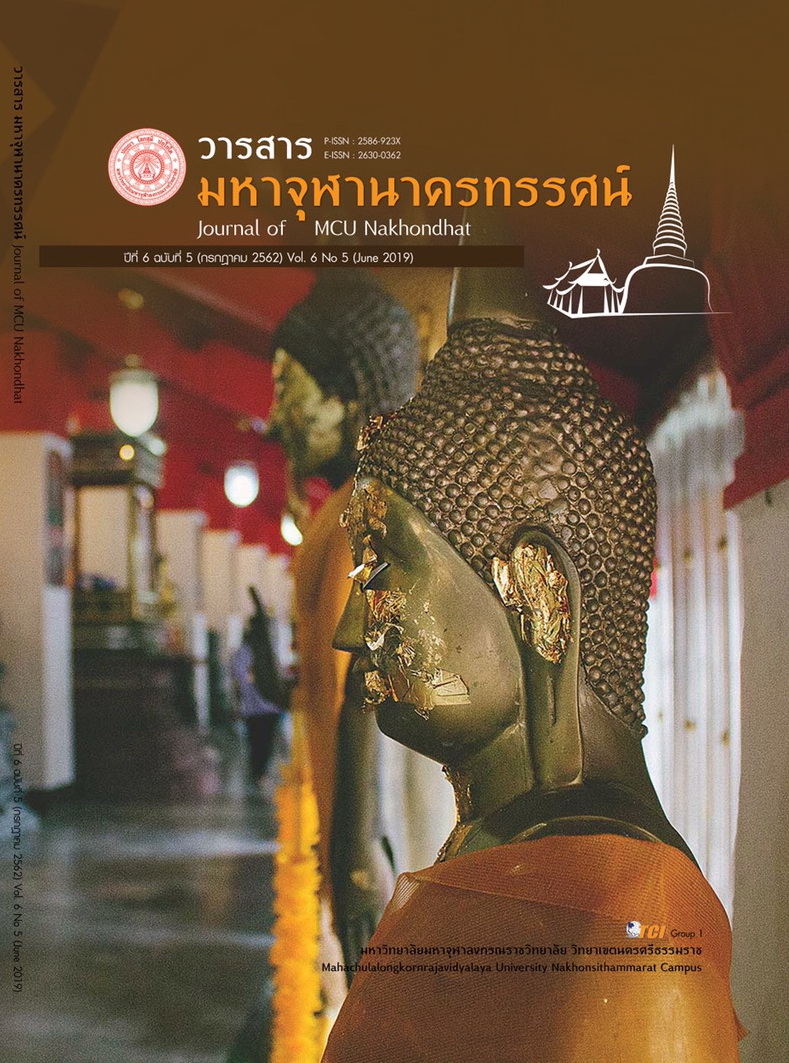FACTORS AFFECTING THE SUCCESS OF STEM EDUCATION MANAGEMENT IN THE SCHOOLS UNDER THE OFFICE OF SECONDARY EDUCATIONAL SERVICE AREA 25
Main Article Content
Abstract
The objectives of this research were to study 1) the manner of managing STEM education in the schools, 2) the factors that affected the success of STEM education and 3) the recommend approach to STEM education learning management in the schools under the Office of Secondary Educational Service Area 25.The sample group consisted of school administrators, teachers and the personnel in the Office of Secondary Educational Service Area 25 who had been involved in the STEM education learning management and were selected through multi-stage random sampling, totaling 430 persons, in academic year 2017. The target groups used in the interview were 3 schools with best practices in STEM education learning management. The tool used for the study was a questionnaire equipped with a 5-level rating scale and the structural interview, a content validity IOC of 0.80-1.00 and a confidence coefficient of 0.97.
The findings showed that:
- On the learning management of STEM education, the teachers managed learning activities in accordance with the interest or problems of the learners by themselves suitable for the school and classroom contexts. There had been the founding of communities of practitioners for the purposes of exchanging integrated.
- On the factors affecting the success of STEM education, it was found that the factors can be organized into 5 groups, i.e. 1) the education personnel, 2) the learners themselves, 3) the networks, 4) the curriculum and 5) the school committee which can explain the variance of all the variables at 60.04%.
- The recommended approaches to STEM education include 1) to develop a STEM education curriculum that encompassed methods of learning management and evaluation to be in line with the standards of the curriculum, 2) for encouraging teachers for STEM education activities within their own context and 3) for establishing cooperation networks on STEM education.
Article Details
References
ชวนชื่น มลิลา. (20 ธันวาคม 2560). รูปแบบการจัดกิจกรรมสะเต็มศึกษาของโรงเรียน และปัจจัยที่ส่งผลต่อความสำเร็จในการจัดการเรียนรู้สะเต็มศึกษา. (รัชนิวรรณ อนุตระกูลชัย, ผู้สัมภาษณ์)
เปรมจิตต์ ขจรภัย ลาร์เซ่น. (2559). สะเต็มศึกษา . วารสารวไลยอลงกรณ์ปริทัศน์ (มนุษยศาสตร์และสังคมศาสตร์), 6(3), 185-195.
พรทิพย์ ศิริภัทราชัย. (2556). STEM Education กับการพัฒนาทักษะในศตวรรษที่21. วารสารนักบริหาร Executive Journal, 33(2), 49-56.
ยุทธ์ ไกรวรรณ. (2551). วิเคราะห์ข้อมูลวิจัย 4. กรุงเทพมหานคร: ศูนย์สื่อเสริมกรุงเทพ.
ศูนย์สะเต็มศึกษาแห่งชาติ. (2558). คู่มือเครือข่ายสะเต็มศึกษา. กรุงเทพมหานคร: สถาบันส่งเสริมการสอนวิทยาศาสตร์และเทคโนโลยี, กระทรวงศึกษาธิการ.
สำนักงานคณะกรรมการการศึกษาขั้นพื้นฐาน. (2558). คู่มือบริหารจัดการเวลาเรียน ลดเวลาเรียนเพิ่มเวลารู้. กรุงเทพมหานคร: กระทรวงศึกษาธิการ.
สิรินภา กิจเกื้อกูล. (2558). สะเต็มศึกษา. วารสารศึกษาศาสตร์ มหาวิทยาลัยนเรศวร, 17(2), 201-207.
อัจฉรีย์ สังขรักษ์ และคณะ. (2560). การจัดการเรียนรู้ตามแนวทางสะเต็มศึกษา เรื่อง การสังเคราะห์ด้วยแสงของพืช เพื่อพัฒนากระบวนการออกแบบเชิงวิศวกรรม ของนักเรียนชั้นมัธยมศึกษาปีที่ 5. วารสารศึกษาศาสตร์ มหาวิทยาลัยสงขลานครินทร์ วิทยาเขตปัตตานี, 28(3). 59-71.


